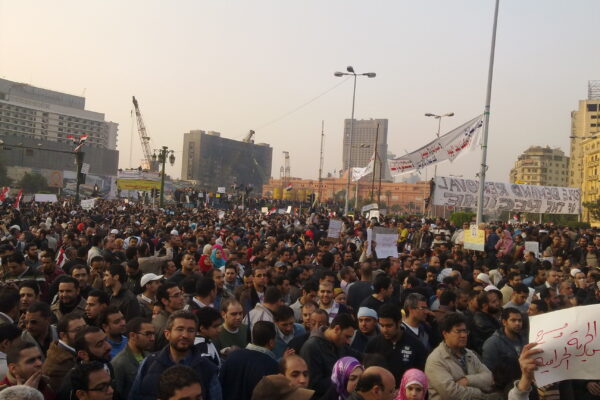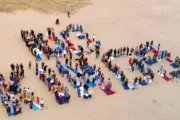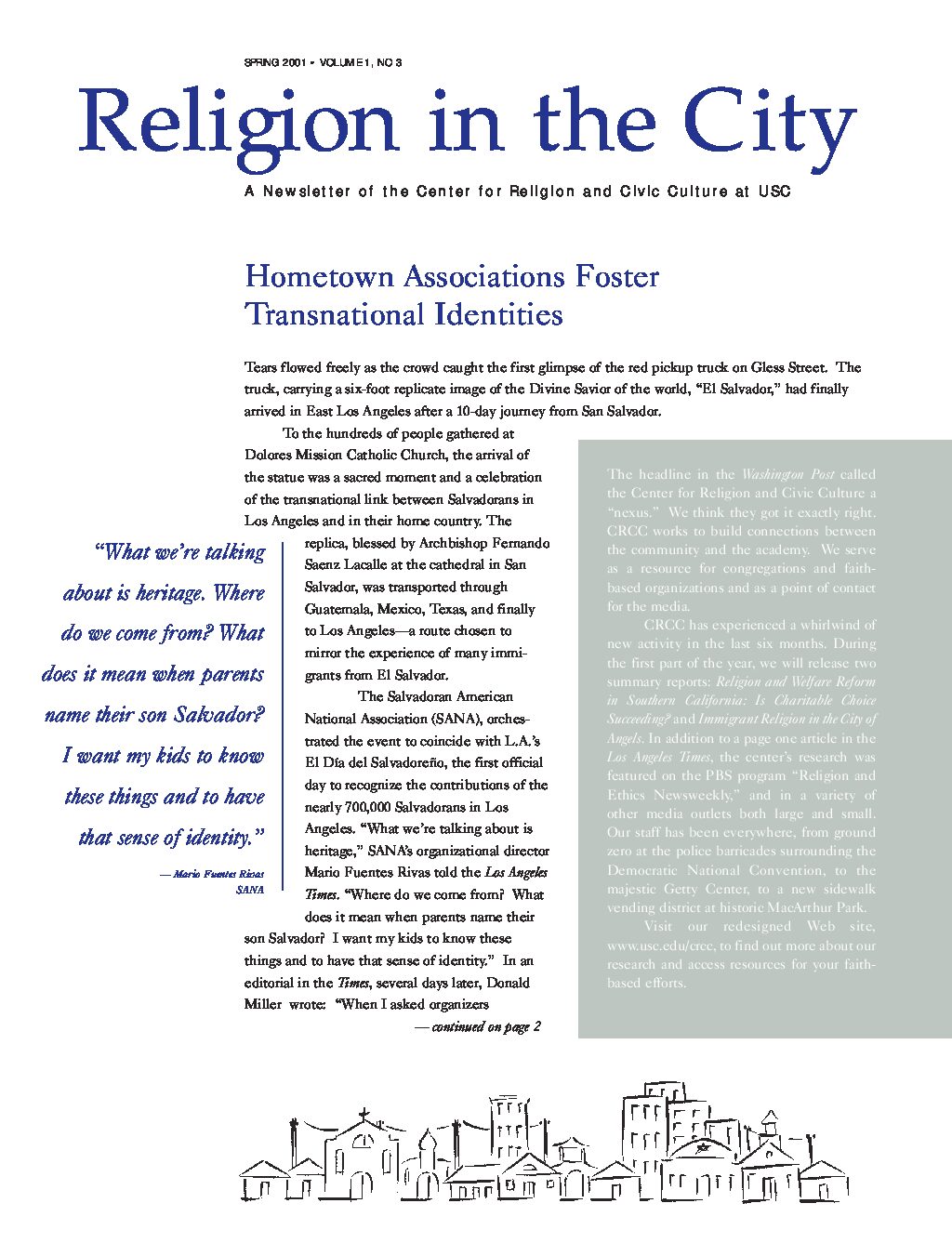On the night of Barack Obama’s election in 2008, I stood outside a dormitory at the University of Texas at Austin, debating two Egyptian bloggers about Obama’s win.
About two months ago, I was watching another U.S. election season when I learned that one of those bloggers had been sentenced to two years in prison in Egypt. Ahmed Naje was convicted of offending “public morals” and “spreading licentiousness” after an excerpt from his graphic novel was published in a local newspaper. The novel, which includes sexually explicit content, had already passed a censorship office in 2014. But an individual took Naje to court, alleging that the novel caused the plaintiff’s blood pressure to fall and his heart to race.
I first met Naje and his best friend, Mahmoud Salem, back in 2008, when I spent a few weeks in Cairo interviewing them along with six other Egyptian bloggers. Under a program funded by USAID and run out of the American University in Cairo, the eight men and women took courses on the U.S. electoral system and then traveled to the U.S. to cover the elections. I reported a story about them for The National, a news magazine based in Abu Dhabi, following the bloggers from Cairo to Austin and Lincoln, Nebraska.
They were experienced, savvy observers of their country and of international affairs. They had blogged about issues facing women, human rights abuses and the struggles of civil society. Wael Abbas, who reported on his blog about police brutality and voting irregularities, received awards from Human Rights Watch and the International Center for Journalists and was recognized by the BBC as one of the Most Influential People of the Year in 2006.
The rich blogging culture in Egypt has been instrumental not only in breaking news but also in pushing back against free speech restrictions. But bloggers often paid a heavy price for their outspokenness. Salem, who blogged anonymously on “Rantings of a Sandmonkey,” later revealed his identity when he went public with videos showing how he had been beaten by the police.
As I reported the story, I tried to understand what it must feel like to be a young Egyptian blogger writing about a completely different political system. The bloggers in the USAID program spoke to elected officials in the nation’s capital as well as to residents of trailer parks and contractors on wind farms. They debated evangelicals on street corners, canvassed in North Carolina and traveled to rallies. On their blogs, they wrote about the everyday as well as the profound.
I was curious what it felt like to blog about Obama’s feel-good campaign, focused on “hope” and “change,” when their own countries seemed so far from just that.
Salem and Naje were funny, ultra-liberal, sarcastic and witty. The pair of best friends represented the future of Egypt. They also were, in some ways, polar opposites. One was a snarky, pro-American, secular, capitalist libertarian; the other, a pro-labor aspiring novelist. The day of the election, they had filmed a spoof at a voting station in Austin, parodying their own system by acting like confused luddites trying to make sense of the American democratic process. After asking whether the voting lines were really bread lines (bread lines were making headlines in Egypt at that time) and noting that there was no judicial oversight at the voting station, they commented on how “safe” the elections felt. Where was the fighting, the arguing, they jokingly wondered. “These poor Americans,” Mahmoud says, laughing, as the scene ends.
Later that evening, Naje told me how his father, then a member of the Muslim Brotherhood, used to dress in his best suit on the morning of parliamentary elections and head down to the polling station. Naje would check up on him later, at his mother’s request, and find his father waiting patiently to vote. When he was not allowed to vote, he would calmly await the arrival of news organizations. When thugs showed up to intimidate voters, he would find out how much they were being paid and offer them more money to leave once the cameras were gone. The whole dance had left Naje jaded.
I knew some of the bloggers had been rooting for Obama, but Naje and Sandmonkey were not. They were skeptical. Debating them that evening, I realized that, deep down, I wanted them to believe that an Obama victory was also a victory for the Middle East, for the Arab world, and most all, for them. Didn’t they see some modicum of hope on the horizon?
It took me eight more years to finally understand the reasons for their cynicism.
While I was filled with hope in 2008, in January 2011 it became Naje and Salem’s turn to demand their own version of “change” in Egypt. They wanted democracy and freedom. They were demanding a new Egypt. As millions took to the streets of Cairo to compel then-President Hosni Mubarak to step down, the United States fumbled its response. For nearly a week, the American government struggled to reconfigure a decades-old policy that supported dictatorships in the region in return for stability.
We eventually supported the uprising, but in the Egyptian election that followed, too many candidates split the liberal vote, which provided an opening for the Muslim Brotherhood. Eventually, the elected government of Mohamad Morsi was overthrown by the military. The possibility of an Islamist government opened the way for a new authoritarianism, the rise of military leader and new strongman, Abdel-Fattah al-Sisi.
The Sisi government, in turn, crushed the Muslim Brotherhood. And, along with the Brotherhood, it has also jailed thousands of activists, journalists and other people who have continued to struggle for democratic change. Naje is just one of many.
A 2013 Protest Law has been used to clamp down on all forms of dissent. The rise of ISIS in the political vacuum of war-torn Syria has made authoritarianism in Egypt more palpable to some, as dictators once again present to their own population and to the world the “it’s either them or us” argument. Naje and Salem and others around the Arab world face the choice of Islamist authoritarianism on one hand or secular dictatorship one on the other.
All the while, America has remained silent, returning to our pre-revolutionary policy of propping up dictators in the name of stability.
The problem is that authoritarianism is not a reasonable long-term solution to anyone’s troubles.
As I follow this year’s elections, I’m baffled by the popularity of Donald Trump and the prospect of the rise of an authoritarian leader here at home. For the first time, I have begun to feel the restlessness and insecurity that the young Egyptian bloggers must feel daily. When Trump tells American Muslims that they are no longer welcome, I begin to wonder what this type of authoritarianism will look like in the United States.
Still, I think about how the religious right has never been fully able to control our democratic process. I think about the separation of church and state enshrined in our constitution and how our political process is so multi-faceted that maybe we’re immune to such authoritarianism.
But then I think of Naje and Salem and how I was wrong about my hopes for Egypt and the Middle East. And I wonder what else is possible. There’s a battle raging for the future of our country, a battle to determine what America is really about. And I find myself praying for all those who fight for democratic political change and freedom on both sides of the ocean.
Another version of this piece ran on Zócalo Public Square.
Photo Credit: Essam Sharaf / Flickr
Rhonda Roumani is a contributing fellow with the USC Center for Religion and Civic Culture and a journalist fellow with the Spiritual Exemplars Project.








